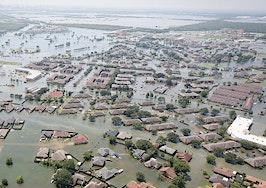A new rule issued by five U.S. federal agencies this week should make it easier for property owners to get flood insurance by requiring mortgage lenders to accept some private policies, rather than only government ones.
The rule, announced Tuesday, goes into effect July 1, 2019. It’s the result of a years-long process that began with the goal of stimulating the private flood insurance market, and seems well-timed given the threat of further sea-level rise to many coastal areas.
In a nutshell, it sets a minimum bar for private insurance policies; if the policies meet those requirements, lenders who require flood insurance will have to accept them.
Homeowners in flood-prone areas have for many years been able to take advantage of the National Flood Insurance Program, which is designed to provide affordable protection against water-related destruction. Lenders who required flood insurance in order to get a mortgage had to accept policies from the National Flood Insurance Program.

A home in Houston that was flooded in the aftermath of Hurricane Harvey. Credit: Jim Dalrymple II
But the program has limitations. For example, it only insures homes up to $250,000. And for commercial properties, the limit is $500,000.
Due to such limitations, lawmakers in 2012 passed a bill they hoped would spur on the private flood insurance market. The expectation was that new private insurers would get into the game and consumers would have better and more comprehensive options.
Tuesday’s rule is a result of that 2012 bill. It works by requiring lenders to accept private flood policies that meet certain criteria, such as coming from a state-licensed issuer and being at least as broad as a policy from the government program.
It’s worth noting that private flood insurance itself is not new and some lenders already accept those policies. However, prior to the new rule lenders could chose to accept those policies or not. It was up to their discretion.
The rule eliminates that discretion as long as the private policies meet the minimum criteria. In other words, in certain cases, lenders no longer have the option to reject a policy.

A flooded church in Houston after Hurricane Harvey. Credit: Jim Dalrymple II
Five different regulatory agencies jointly issued the rule: the Federal Reserve Board, the Farm Credit Administration, the Federal Deposit Insurance Corporation, the National Credit Union Administration and the Office of the Comptroller of the Currency.
The new rule comes amid increasing concern across the country about climate change-fueled disasters. According to FEMA, floods are the “nation’s most common and costly natural disaster and cause millions of dollars in damage every year.” Recent years have seen costs from flood-related disasters soar even higher; the National Oceanic and Atmospheric Administration (NOAA) estimates that in 2017 alone weather events had cumulative costs of $306.2 billion.

A Houston gas station that was flooded during Hurricane Harvey. Credit: Jim Dalrymple II
Significantly, the 2012 bill that led to Tuesday’s rule was passed just months before Hurricane Sandy, which wreaked havoc across the Eastern Seaboard and cost about $71 billion, according to NOAA.
Despite the staggering costs of weather and flooding disasters, the private residential flood insurance market represents only 3.5 to 4.5 percent of policies, according to a report last year from the University of Pennsylvania. The report explains that traditional insurers have historically been reluctant to get into flood insurance due to regulatory huddles, though that is changing as they gain more experience with the sector.













